The year 2013 was a good one for Jessica Ennis-Hill, the early favourite for this year’s BBC Sports Personality of the Year (Spoty) award. Already an Olympic champion, Ennis-Hill was made a CBE and offered the Freedom of the City of Sheffield. Similarly, Andy Murray, the second favourite for this year’s BBC gong, won Wimbledon, watched by his wonderfully supportive family, and later became an OBE.
For Tyson Fury, the newly crowned heavyweight champion of the world and a late entrant on the list for the BBC’s top award, 2013 was a bit more complicated. Rewind two years and Fury, an outsider even in an outsider sport, was busy telling an interviewer before his first fight at Madison Square Garden that he would “hang” his own sister if she was promiscuous. In March that year, he was fined £3,000 for calling fellow fighters David Price and Tony Bellew “gay lovers”. In September, he was publicly pleading for the release from prison of his father, “Gypsy” John Fury, who was serving nine years for gouging a man’s eye out during a street fight – albeit a man who was, according to Gypsy John, attempting to chew his face off at the time.
Little wonder the presence of Fury on the Spoty shortlist has created such friction over the past week. More than 82,000 people have now signed a petition suggesting Fury’s views on homosexuality should disqualify him from the BBC awards. The trigger was an interview before his title fight with Wladimir Klitschko last month. Fury had, as he tends to, begun discussing Armageddon and the end of the world, offering up the opinion that the legalising of abortion, paedophilia and homosexuality – equivalents in his “scriptural readings” – would signify a kind of Old Testament-derived reckoning.
A week later, interviewed about his previous interview, Fury threatened to have the journalist involved violently beaten up by his entourage. In the same interview, he was asked his opinion of Ennis-Hill. “That’s the runner, isn’t it? She’s good, she’s won quite a few medals, she slaps up good as well,” Fury replied. “When she’s got a dress on she looks quite fit.”
He was, to be fair, encouraging on the subject of female boxers, applauding their choice to enter the sport, before adding weirdly: “I believe a woman’s best place is in the kitchen and on her back. That’s my personal belief. Making me a good cup of tea, that’s what I believe.” Tyson, thanks. And on that bombshell it’s back to you, Sue Barker, in the studio.
If there is something startling about hearing these kind of views voiced by an A-list sportsperson in the mainstream media, then the sense of worlds colliding, of something raw and genuinely other about the current heavyweight champ, extends way beyond the BBC’s annual vicar’s tea party. Those hearing that jabbering Lancastrian monotone for the first time, taking in that 6ft 9in (2.06m) shaven-headed, motor-mouthed, deeply menacing figure, might be tempted to dismiss Fury as simply a bully and a goon, a Twitter troll made flesh, Dapper Laughs with muscles. Look a bit closer and it might be easy to write him off as a damaged lot, some deep male nightmare of rage and exclusion, unformed and raw, blinking in the light, Grendel licking his chops.
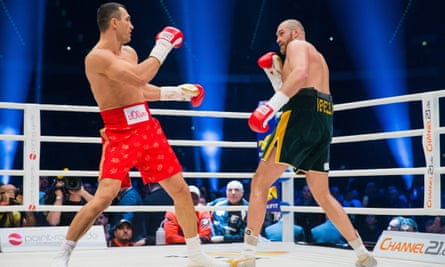
29 November. Photograph: Rolf Vennenbernd/DPA/Corbis
The truth, as ever, is less clear-cut. Fury is more than simply a cartoon, something other than just a tedious loudmouth. At the very least, he’s an interesting loudmouth, by all close accounts that rare specimen, the tender and personable bully, a macho braggart who also admits to being terribly fragile beneath the bluster.
But then boxing is a sport that has always inhabited the margins. This is a genuinely extreme form of human activity, a matter of formalised violence and sculpted rage, practised in the main by those with little opportunity to pursue anything else.
For all the noise and violence, it is impossible to become a champion boxer without possessing supreme levels of discipline, competitive intelligence and tactical wit. Fury spoke like a dolt either side of his world title bout in Dusseldorf last month. But, in the midst of it all, he fought a brilliantly controlled, intelligent heavyweight bout to take the title, a staggering achievement for a man who, five years ago, was living in a caravan in Morecambe, and whose life has been a peculiarly extreme blend of the disorderly and the doctrinal.
Born in Manchester into a family of Irish Traveller heritage, Fury was named after Mike Tyson by his father, himself a former pro heavyweight. He has described his childhood as a kind of rolling trauma. “When I was a kid, we didn’t have a family life. My mother and father were always shouting and screaming and hitting each other. My dad had different women and different kids down the road. My mum had 14 pregnancies – but only four of us survived.”
Fury was trained by his father and uncles, and was a good, if not exactly stellar, junior, becoming national champion in 2008. Success now is unlikely to change a relatively humble lifestyle. Fury still lives in Lancashire. Husband to Paris, father to Venezuela and Prince, with another baby on the way, he can be, according to those who know him, a hospitable, gentle, funny, talkative, slightly disarming presence.
He has apologised for his comments about Price and Bellew. A statement put out by his uncle Peter Fury last week read: “I would like to put on record that I am not homophobic. I have homosexual friends and I do not judge them because of their sexuality. My comments that you may have read are from the holy scriptures, and this is what I live from.”
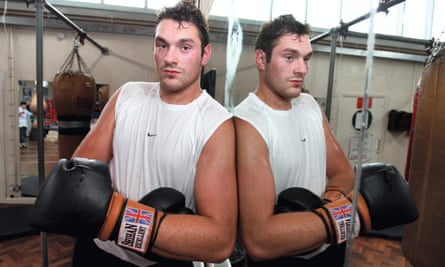
If there is a degree of confusion in Fury’s public attitudes, there is a clarity in his view of his own fighting destiny, which he sees as a blend of two righteous traditions. Not only was his father a fighter, Fury is also a distant relative of Bartley Gorman, the bare-knuckle king of the 1970s and 80s who fought in quarries and at horse fairs, and who remains a Traveller legend. “I am fighting royalty,” Fury once said. “I have Gypsy kings on both sides of the family.”
This ethnicity is, for Fury, crucial. “People have got to understand that our lifestyle is totally, totally different,” he has said. “We may be the same colour, and we may speak the same language, but deep inside we are nothing alike. We are aliens.” In Fury’s version, this is a muscular, patriarchal world of blood ties and blood feuds, where women have “no rights” (“In our culture it is all about the men, the men can do everything, and women just clean and cook and have children and look after that man”).
It was here, in the idea of noble familial tradition, that the idea of murdering his sister first cropped up in public: “That is our way. Just like the Muslims have their ways. We have our ways. There are these girls who want to open their legs to every Tom, Dick and Harry. But they are looked upon as rubbish in our community. We don’t do stuff like that. If I had a sister who did that … I’d hang her. She would bring disgrace on the family. It is a very, very bad thing to do. We don’t do that. Women have to be pure and respectful.”
Men, meanwhile, must fight. “If you want to fight, you take your shirt off, you go outside and you have a knuckle-up, and the best man shakes his hand and they go off for a drink,” Fury has said. “I’ve had hundreds of challenges at Traveller gatherings. They get a few beers in them and they start thinking they are Tyson or Ali; throwing punches, swearing and jumping around with their big fat bellies. I’d love to knock a few of them out.”
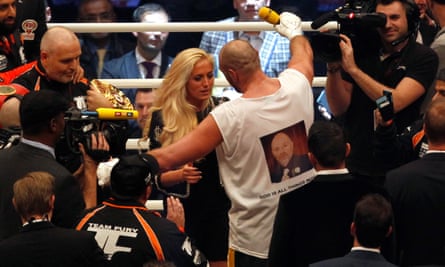
There is almost an underdog warrior king aspect to all this, a Hollywood-ish quality, in an emissary of this fat-bellied, car-park-fighting tradition becoming the heavyweight champion of the world. That is, if you can soft-pedal the other side of this twin sense of destiny: Fury’s rigidly censorious form of born-again Christianity. Like quite a few violently newsworthy young men these days, the current heavyweight champ is also a religious zealot. Fury was radicalised by his uncle Ernest, a born-again Christian and preacher. It is from his reading of the Bible that his more controversial, illiberal beliefs seem to spring, including the idea that the correct punishment for paedophiles (a recurrent theme, for some reason) would be to “let them in a room with me and two hammers, I’ll smash them to pieces”.
Beyond religion, beyond family, the third element in this holy trinity of outsiderdom is depression. Those who meet Fury often talk about his sudden tenderness, the startling contrast between a boxer’s bombast and some genuinely open and frank dark-night-of-the-soul stuff. Others can feel disturbed by a man who talks about the world ending, and ending it all, with alarming frequency. “I do sometimes think life is pointless,” Fury told the Guardian’s Donald McRae in 2011. “One minute I’m over the moon and the next minute I feel like getting in my car and running it into a wall at a hundred miles an hour. I don’t know what’s wrong with me. I’m messed up.”
As, for now, is the BBC Sports Personality of the Year award, clouded not just by Fury’s presence but by a more generalised sense of confusion. Certainly, the idea that sportspeople should be ushered out of sight because a voluble majority dislike their political and religious views is unlikely to leave us with many left to look at. “Hopefully I don’t win @BBCSPOTY as I’m not the best roll model [sic] in the world for the kids, give it to someone who would appreciate it,” Fury tweeted shortly after the petition against his presence had been launched. Ragged, raw, funny, blinkered, tetchy, champing, dunderheaded: Fury is both a genuine sporting star and a voice from the fringes, unvarnished, untempered, unapologetic. One thing is certain: he is unlikely to go away any time soon.
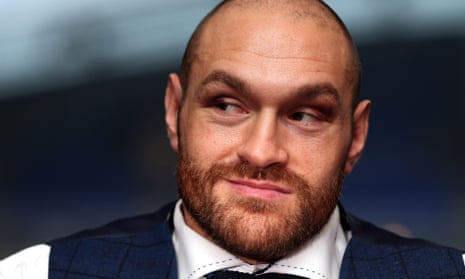



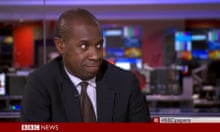
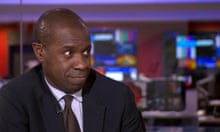


Comments (…)
Sign in or create your Guardian account to join the discussion